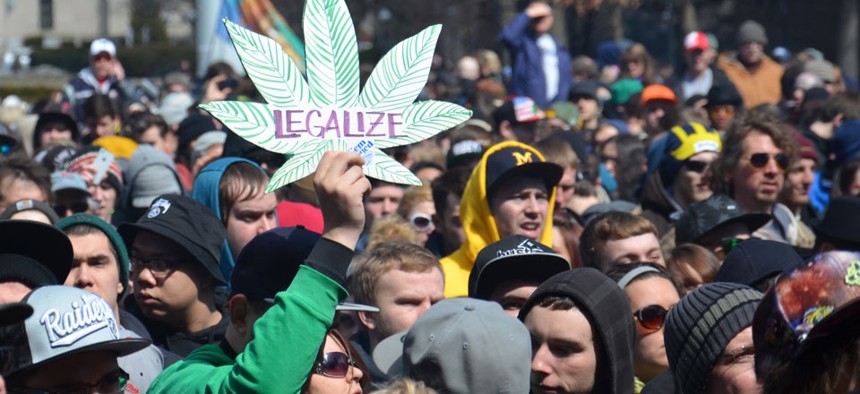When Liberal Causes Don't Stand a Chance in Washington, Activists Go Local

A participant holds up a sign a rally in April in Michigan. Susan Montgomery / Shutterstock.com

Connecting state and local government leaders
Gridlock in Washington and a Republican Congress are making liberals look to states and cities—where things are actually getting done.
he same day that brought a slew of new Republican lawmakers into both houses of Congress also saw a host of liberal measures pass in the very states that were voting for GOP candidates. Successful ballot measures legalized marijuana in Oregon and the District of Columbia,raised the minimum wage in four states, and introduced stringent background checks for gun purchases in Washington state. In Colorado, an antiabortion measure to add "unborn human beings" to the state's definition of personhood failed by a margin of more than 20 points.
There's a reason these liberal causes fared well on local ballots, even as more conservatives were voted into Washington. Left-wing activists are pouring their time and money into smaller-scale fights—statewide or more local still—as the prospect of passing federal legislation becomes less likely.
"Given the gridlocked and polarized nature of Washington, it is the states and cities that are leading the way," says Paul Sonn, legal codirector of the National Employment Law Project, which advocates for a higher minimum wage.
Sonn says his organization is spending more and more of its energy on these smaller-scale reforms. "As Washington has proven less functional and able to tackle serious public policy issues, the share of our organizational focus toward state and local campaigns has certainly increased," he says, a trend that he thinks will "absolutely" continue.
Gun-control advocates are taking a similar state-by-state approach. With stricter national gun laws looking increasingly unlikely, Everytown for Gun Safety, an advocacy group funded by billionaire and former New York Mayor Michael Bloomberg, is putting its issues directly in front of voters. Washington's ballot initiative to expand background checks for gun purchases was a top priority for the group, and it spent $4 million to help it pass.
"The only Washington that really matters is Washington state. It is the only up-or-down vote in the country," John Feinblatt, the president of Everytown, told National Journal's Lauren Fox. "The NRA can bully politicians, but they cannot bully the American people."
Environmental groups have also narrowed their focus. "Congress hasn't been producing results," says Keith Gaby, communications director for climate and air programs at the Environmental Defense Fund. But the political atmosphere in states is less acrid, he says. "Things are, I think, in most places at the state level less partisan than they are in Washington.… Folks are willing to work together because problems are right there in their backyard."
Gaby pointed to emissions regulations that were approved in Colorado this February as an example of what can be done at the state level that probably wouldn't succeed nationally. To come up with regulations that would pass, the EDF coordinated with Gov. John Hickenlooper's office and three of the state's largest oil and gas producers. "You know, that's the sort of industry-environmental-political cooperation you'd be less likely to see these days at the national level," Gaby says.
And these aren't the only causes that are being localized. The battle for same-sex marriage and LGBT rights has been increasingly fought in the states, where both have made significant gains. If Washington sinks deeper into gridlock when the new GOP Congress settles in this January, liberals will likely turn their backs to the Capitol and look to states and cities—at least until Congress becomes more open to their causes.
This article appears in the November 10, 2014 edition of NJ Daily.





